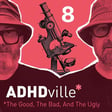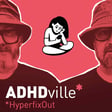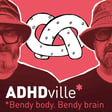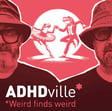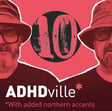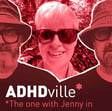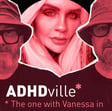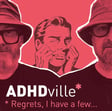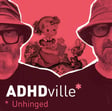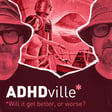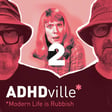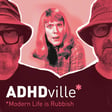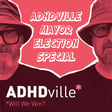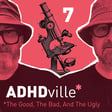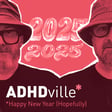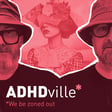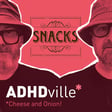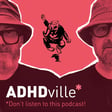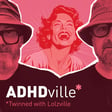The Mood-Boosting Power of Hats
00:00:00
Speaker
And we're back in the room. Back in the room with a hat. And Paul's got his magic hat on. Yeah. I like hats. I like wearing hats. They make me... I find them quite, like, elevating. If I'm in a bad mood or... the quo it like I could switch up my mood by putting a hat on. Get a head. Get a hat. can't Get a head. Get a hat.
00:00:29
Speaker
important chronological. Get the head first, then the hat. Yes. Well, you could get the hat first, then the head. Where did the head first? Nice. Get a
One Year with ADHD: A Retrospective
00:00:39
Speaker
hat. All right. So this podcast is really about, I think, isn't it's it's the journey from like, it's that one year mark from, wait so what can you expect after a year after being diagnosed? Yeah.
00:00:58
Speaker
what Yeah. What milestones have we passed along the way from, from in that one year mark, which is mostly going to be about your experience because you are, you are one year in. I've just passed the mark. I've just passed that mark. Yeah. Yeah. Which is, which is, um, so yeah. So let's crack on. And with that, uh, the camera's bouncing up and down. Let's say, uh, welcome to ADHDville.
00:01:45
Speaker
It's a year on, year on. Although I was diagnosed with a combined ADHD almost exactly, more or less and getting on for ah just past actually a year ago.
00:02:00
Speaker
And I'm Martin West and I was diagnosed with the combined poo poo platter of ADHD in 2013. So we just here as two mates who by coincidence or not in brackets, after 39 years of friendship discovered there were co-ADHD as there are now it's really important to say this is an entertainment podcast about adult ADHD.
Entertainment vs. Professional Advice
00:02:24
Speaker
Does not substitute for individualized device or qualified health professionals? No.
00:02:28
Speaker
always the most difficult. I need to to always take a run up to say that bit. So don't take any advice from ah especially me. We're just kind of here as an all inclusive ADHD part base. We've room for anyone, everyone even, including your double gangers, your alter egos, your buddy doubles, your chaperones, and your best buddies still here. Yes.
00:02:47
Speaker
Still here? Well, Martin is. yeah I'm still here. Then grab your jet packs, your pediloges, space hoppers or any other transportation methods and let us take you to a DHD real and imagery town we've created in our minds.
Welcome to ADHDville
00:03:03
Speaker
We would like to explore different parts of the A, the D, the H and the D. In our minds. In our minds. Waiting for the echo. That was it.
00:03:14
Speaker
Um, uh, and we start off as always here at the town hall in the mayor's office where we, yes the joint mayors of ADHD will take care of business. And this week, just looking at my agenda, we're going to be talking about, yeah, this, this one year on what that journey can be like and what it's been like for Paul. And I'm going to be chipping in because, because that was a long time ago for me, but no doubt.
00:03:43
Speaker
No doubt I will remember. remember So where short let's go to the coffee. OK, let's go to the coffee shop. Yeah, yeah let's come let's get a.
Personal Diagnosis Reflections
00:03:54
Speaker
yeah Yeah, because I know that in the script here says let's head down to the basement. and Yeah, but that's from the last episode. Yeah, and and I don't have the basement file loaded. So let's jump stop chied up in the mayor's cab and we'll go to the coffee place. Okay.
00:04:31
Speaker
This was all done on a computer. I never played that guitar. I'm going to get them in this time. What are you having, Martin? um I'm going to have a and decaf cafe au lait.
00:04:50
Speaker
but life lay they like k okay are they out scar all ah vanish isn' that an infusion i kind of yeah lemon it's my goto fusion is lemon and ginger martin oh I love a bit of lemon and ginger. I will sometimes have a lemon ginger tea. Yeah. I make it, I make it myself rather as well as chopping lemon and a bit of ginger, boil it up to the best oh ever. Oh, wow. Lovely. Cheap as well. Anyway,
00:05:20
Speaker
That's nice, dear. So we're at the coffee shop, are we, Marty? So we're going to talk and about, yeah, the first 12 days. Holy moly. This was quite hard to talk about, ah hard to write about. Can I just point that out? All right. It's a lot to unpack. Okay. All right. Well, let's get unpacking then.
00:05:45
Speaker
Let's get unpacking. Let's start. Okay. So where's, okay. Well, there is
Diagnosis Variability and Criteria
00:05:54
Speaker
actually a point, like ah my girlfriend was asking me, because we've we've started to think that she's on the autism spectrum, right? My girlfriend, oh so she said to me, oh, you know, what happens when you go for the diagnosis?
00:06:08
Speaker
And how do you, how can you be sure that the person that's given the diagnosis is up to, up to the, up to the responsibility that's got the right skills to do a proper diagnosis. And I said, my response was really ah by the time you've got to that point, you've already got like your square, square pegs already hovering over the square holes.
00:06:34
Speaker
In theory, yes. It's not like, it's not going to be that many surprises. You've probably, most people have done, especially if if you've had to wait for the diagnosis, most people have like read up on it. You know, you we followed our podcast.
00:06:51
Speaker
Absolutely. That is like in the, in the, in the criteria, like, uh, have you, have you listened to the ADHD for podcast? Yes. Okay. Yes. Right. Ticket that box. They give you an extra fat marker for that one. Yeah. Um, but yeah. Um, I mean, it's not like you coming at it, like, like something new, and especially if you're really late, late diagnosed, like us, it's like everything kind of makes sense already. that the Okay.
00:07:19
Speaker
You know, even however little research you've done, it's like, yeah, that makes sense. But I would say that, um, it, it does like, you could go to 10 people and you wouldn't necessarily get the same result out of all 10.
Paul's ADHD Journey in Italy
00:07:45
Speaker
Because some of those questions in the, in the, in the, in the, cry in the, criteria the criteria, I kind of hope that they're somewhat open to interpretation. Yeah. So. Mm hmm.
00:08:03
Speaker
it's if if you get someone who is not who is not really on the ball then they could give you ah a a they could yeah do you wrong because actually some of those questions are actually quite you know you might answer them in the wrong way, right? So it's quite common. I think one of the questions is like, do you um collect things around a category? So and this is like, you know, um
00:08:41
Speaker
but true trains, planes, you know, I don't know, rocks or something. and And then you kind of go, yeah, no, I ah don't collect planes or trains or rocks. So you go, no, no, and but I don't really collect things. But actually what you do do is you collect information about ah did I don't know, a certain topic, right? yeah And it would and you you just have to hope that whoever's doing the dike and the nosing kind of understands. They can interpret.
00:09:16
Speaker
Yes, can interpret your your wrong answer. yeah Because you might just go, no. yeah And that person might go, oh, no, OK. They don't get ah show that behavior. So they'll not. It's like, are you always late for appointments? No, I'm not. I'm always on time because I'm a people pleaser. So that kind of like merges in with with appointment keeping, which is not like, oh, do you have trouble sleeping? No.
00:09:47
Speaker
Yeah, so it's yeah. So yes, if you get a bad person, yes, you will get a bad ah result. So um yeah, I know, I know that at least yeah. Go on, Mr. Thompson, after le you can afford to go private. I think generally what I've heard is private if you if you can afford to go private, if you're lucky enough to to afford that it is generally better.
00:10:16
Speaker
Yeah, generally. All right. So, like so so we're so we're right at the beginning. We're on the diagnosis part of this yeah of this journey. Yeah. And my experience was like, yeah, diagnosis, it was it was ah it's a bit of a shit show, if I'm honest.
00:10:34
Speaker
It was a bit of a joke in it. I live here in Italy. If you haven't listened to a podcast up to now, um, go back and listen. to I think it was the first podcast. It was about my diagnosis. has one yeah Yeah. Um, it was terrible. It was really, really bad. I mean, if if I'd sent my son to the same department of this, the hospital I went to, I'd be spitting blood. I'd be really angry with how bad and irresponsible they were.
00:11:02
Speaker
They're just really blasé about it, and mechanical.
Reframing Past Experiences Post-Diagnosis
00:11:06
Speaker
Yeah, it was terrible. so But my point of view, because I was diagnosed at 56, no, 56 at that time, everything kind of resonated. I didn't only needed confirmation, ah but it did make a difference.
00:11:23
Speaker
being diagnosed, having that stupid rubber stamp, say, okay. He's both attention deficit and a hyperactive disorder. So it's both ends of the ah of, uh, of the ADN, the H and the D, um, and then offer win into the world, you know, carrying this, this new kind of like, I guess, what, oh, I call it. I started just right from the word go, like reframing everything I'd freaking learned from that point, you know, in my history, everything had to be reframed.
00:12:03
Speaker
um And in the beginning, I knew like a new toy, like a kid with a new toy, and everything was great. It was like, who is exciting and stimulating, obviously. Yeah. but yeah Because when you get that, um that diagnosis, there is a period actually, which which is quite intense at at the start, isn't it? Where you are, really where you are suddenly finding answers to all of the stuff in your life like, oh, that explains why I'm always like, oh, that explains why i i I struggle holding down a job or or whatever it is. um yeah And so all these answers kind of start coming at you. Yeah, this is okay. Yeah. i love
00:12:49
Speaker
And at the end, at the end of this thing, I've i've actually got talking about reframing, I've actually got a list of like nine or 10 things in pretty much in order of priority up until the first one in order project, what actually I reframed in the last year that I'll run through really quickly at the the end of this year. But yeah, I did feel like validation
Medication and Lifestyle Challenges
00:13:13
Speaker
acceptance right from the start.
00:13:16
Speaker
which was, which was, was all really great. And yeah, I did have this like first three months kid with a new toy. Then after that, after about three months, it started to like, really, I was exhausted and overwhelmed just just how much stuff there was.
00:13:33
Speaker
to like relearn as I call it. You mean like um ah you kind of realized where you were. And I, we were doing just starting the podcast and then we were doing we did a lot of stuff on the TikTok. And at one point I just had to like get off the ride ADHD ride for two or three weeks. Cause all I was doing is all I could, my head was just full of that.
00:14:04
Speaker
You know? Yeah, yeah. Tried by fire. Tried by fire. And then that's what another aspect of it was because I tend to tended to and in this case as well, when I've got confronted with a challenge, I tend to like close up a bit and like shut up shop. oh And I wasn't very communicative about it. And it's like my girlfriend was like feeling a bit left out, which is another aspect it was quite common, I think.
00:14:34
Speaker
you know, with your partner's feeling like, the co Paul, what's going on? What's going on after your diagnosis? And that's something that I've only come into terms with now actually getting better at helping her to help me, which is really, really cool. um Really important part.
00:14:52
Speaker
Right. Um, but yeah, just so much stuff to unpack, but here's the thing. I thought at the beginning, I'm not sure how you felt, Martin. Uh, I know for you it's 13 years ago, but I thought oh I would be able to do this without a psychologist or a psychiatrist. Actually looking back, reflecting now, I, I wish I'd, I'd, um, I'd taken a psychologist along for the ride on that in that phase.
00:15:22
Speaker
Even though if I thought I could do it myself, I think I could have done with someone else. It's like, Paul, okay. But not, you know, finding the right one, but someone actually knew, had experienced with other patients, right? yeah yeah What it's like to go through that, that reframing and relearning. There's a lot, right?
00:15:48
Speaker
Yeah, I would actually point out, ah at this point, it's quite common to ah to start meds, right? Yes. um Or to at least start with supplements or something like, you know,
Partner Involvement in ADHD Management
00:16:03
Speaker
but I know that yeah I got on VA events or L events quite quickly. um So I kind of jumped on that and that was,
00:16:15
Speaker
that was that was a ah weird fun strange experience just kind of like trying that out and seeing how that yeah worked so yeah there was a lot of stuff going on in that period yeah yeah right and i i found that i couldn't find anything that worked for me and i'd stopped i think after about three months stopped with everything And then because it was a state, um, I was working with a state psychologist, um, a psychiatrist rather. And he said, okay, well, I can't, they said, I can't help you out anymore. You need to go see someone private. He basically saw, okay, you're on your own now. Okay. Thanks. You know? Okay. Which I haven't done yet. Um, I'm just like playing with the idea at the moment with it's okay for the moment.
00:17:08
Speaker
ah Money, money, money. Must be funny. But then that's the thing, isn't it? Talking about money, money, money. Psychology is for a lot of people, actually. so It's a is something a luxury a lot of people can't afford, let alone finding a good one.
00:17:24
Speaker
yeah It's, I mean, it's expensive for a lot of Stuff of a privilege. Yeah, for sure. Especially if you want a good one, you know, it's like the good ones, ah they they cost money for a very good reason because they're damn good, you know? Damn good. And effective.
00:17:45
Speaker
So yeah that was, so yeah. What's next on your travels of the year into ADHD? Next on my travels is, um yeah, go back to the thing about helping people to help you. So I was actually used to a book, a podcast last night with Dr. Ned Halliwell, who was like one of the top experts in the States on ADHD. And he said something really, really, really interesting. It really resonated for me. He said,
00:18:14
Speaker
um you ADHD, he has ah t ADHD. ADHD would always work better when you're connected with people. So for me, for example, I was feeling like, I don't know, a bit overwhelmed at times. I like went into my own shell. I kind of shut up shop a bit and just like feeling a bit overprotective about, you know, vulnerable even at this stage. And he was saying, you know, it, it's always better to get, get actually more connected maybe than you ever have been in reality. It's never pays to be, to disconnect with, you know, with your immediate family your partner or your your wider kind of you know friend uh you know group of friends so or family and that really resonated for me and i've i've only started to like get better
00:19:10
Speaker
bringing my partner especially into it and to like help her to help me because you'd never assume it. You'd never assume, oh, I've got, I've been diagnosed with ADHD. You've got to fight for my corner. Well, you've you've got to give them a reason, you know,
00:19:25
Speaker
they've got to like, it's not like, oh, just assume that they're going to do that. You've got to like help them to help you. Cause it's not easy. Yeah. Yeah. For sure. So I mean, like my point.
00:19:37
Speaker
as I've said it before is is ah is if you have a partner and and its start in know and and it's a-term partner, you will change. as time goes on, right? You yeah you won't ever be the the the same person that that you that you met. So that means that youre your partner or yourself has to change with the other person.
Life Reframed by Diagnosis
00:20:01
Speaker
So if they start going off exactly in one direction, say they get an ADHD diagnosis, it's also your responsibility as a partner to
00:20:11
Speaker
to follow that journey. Because if if you don't, that's where you split up. That's the start of like where you divide.
00:20:22
Speaker
dear vi so yeah know Especially if you you know you go through a phase of being a bit overwhelmed with the amount of unpacking attitude you have to do. and My girlfriend, I think, at times felt like she was, you know, sidelined a bit, you know. um So it's not it's not easy at all. It's really not easy. And it's, you know, it's hard for us to understand, you know, but um I had a conversation with my girlfriend, for instance, she said, Oh, I said, Oh, have you not read up about ADHD? Have you done any research? She said, she said, I don't have to, because I've got you.
00:20:59
Speaker
Which is my response was, yeah, I get that, but I've got so much that I need to learn. I would be really helpful if you did, you know, I'm not, you don't have to like, you know, dedicate 24 seven to it, but it helps because I can't do it all myself. I can't do all the learning myself. And she's got really good at it actually.
00:21:21
Speaker
All right. Recognize certain situations, you know, when I'm tired and like start to make allowances for like, Oh, okay. Is this Paul, you know, because he's tired and irritable, or is there something else going on? You know, just nuance, more nuance, the kind of level of communication and understanding.
00:21:44
Speaker
So then I've got conclusion, but i've I've got in order of like chronological order of okay what are they um I've reframed and relearned, okay leading up to like the big one. okay So basically I relearned about my eating habits, easy one, straight off the bat. you know Like why I had struggles with my ah certain textures of food, consistencies of food, that's the easy one.
00:22:14
Speaker
Uh, two, I've got shame with my, so I reframed my shame that I've perceived laziness that I, I shamed myself with. Okay. Okay. Three noise pollution completely reframed that. I just like a lot of shame involved with that. Um, it completely changed the way I thought about how irritable I became about noise pollution.
00:22:40
Speaker
Underachieving at school, number four, underachieving at school really reframed that, you know, that sense of, okay, if I could tap myself in the shoulder now, you know, what would I say to myself? I'd say, you know, Paul, you're not stupid. You're actually intelligent, but not in intelligence that maybe the school wants you to be intelligent, etc.
00:23:02
Speaker
underachieving in my profession, number five, six, why I like spending time alone. Okay. Seven, partner, dish partner choosing decisions, respecting my own personal needs, listening to myself and allowing those thoughts to be properly considered. You know, so whole thing about the people that you decide to share your life with, like that was reframed. So go get into like quite big stuff now, right?
00:23:30
Speaker
eight why i felt why i always felt like an alien okay classic okay yeah nine being misunderstood okay ten self-sabotage this is a massive one that's been a massive one of like seeing like this like trail of freaking mess that I left behind me you know that it's totally self like that I basically I burned bridges and equated so much mess in my past totally reframed that and last but not least the big one number 11 it's written down here who the fuck are you who the fuck are you Paul if Paul is really your name
00:24:17
Speaker
if If it's real, so ah unlock ahlock your masking to unlock your authenticity, your true self. I mean, how can you possibly, before diagnosis, discover who you really are? How can you be authentic if you haven't been already diagnosed with ADHD? That's
Understanding Through Diagnosis
00:24:35
Speaker
the biggest one of all of them, probably.
00:24:39
Speaker
Yeah. so yeah oh I would say there's going to be some people hoping I'm down because i know because because that they'll be saying some of those are quite autistic rather than ADHD. So so um I am not going to unpick those, but just to kind of note that You know, like, like some of those, some of those are that it's called Venn diagram of the two. Exactly. I was just about to say some of them overlap.
00:25:14
Speaker
m And I haven't, you know, that's been part of this last year as well. Like gradually slowly, but surely realize it. Okay. Autism. Hmm. Well, what else have I got? com male csel I don't know. 85% of people, 85%. There's a number Martin. There's a number 85% of people that have ADHD have some kind of autistic trait spectrum riot deal going on gig.
00:25:44
Speaker
Yeah. Yeah. There's, I mean, I would say there's probably a hundred percent likelihood you've got some other, something else going on. Like, like you just get that kind of ADHD thing going on and you kind of go, okay, well that, that, that explains a bunch of stuff, but it doesn't explain another bunch of stuff.
00:26:06
Speaker
Yeah. And then you start digging around and it's like, Oh, I've got resec, rejection, sensitivity disorder. I've got anxiety. I've got depression. I've got, I've got autism. I've got dyslexia or, or numbers thing. And I mean, there's a whole bunch of stuff that fun friends, ADHD has got some fun friends that it comes along with.
00:26:27
Speaker
quite often and you and you end up having a period of working it out. It's been a roller coaster, Martin. It's been a roller coaster. Bear in mind, I don't like roller coaster. I hate fairgrounds. Do you like fairgrounds, Martin?
00:26:45
Speaker
I big question. I know tricky one. They are. I do. I get excited. if If we're going to go to a fairground, I get excited about going. I um ah get excited wandering around. It's almost like if I could just walk around a fairground. That would be enough. That would be okay. of ah if If I never went on a ride, I'd be all right with that. I'd be exactly the same.
00:27:17
Speaker
Right. I'm exactly the same. Yeah. Totally. I can't go round to round because of, yeah. Yeah. It's been hard. It's been really, really hard, but here's the thing. Uh, and I know this is one of the most, um, overused expressions out there. It has been totally and utterly life changing. All right. Yeah. Totally and utter life changes. it's Like, wow.
00:27:46
Speaker
Um, at times mostly highly stimulating and really exciting and, uh, sometimes joyful and marvelous and you know, amazing, sometimes not.
Self-Awareness and Growth
00:28:02
Speaker
But the most it's been definitely, I know it once it says, oh, I hate that expression, game changer. Oh God, I hate that expression, but but that's just me. It's been life changing, totally life changing for me. And it's been really profound in the last 12 months. I always think of it as like,
00:28:23
Speaker
You know, like you, you're kind of half blind almost, right? You've got really blurry vision and then, you know, and then some, someone puts some glasses on your face and you're like, oh, oh, I was blind and no one can see. Oh, oh Jesus. Is, is that what the world looks like really?
00:28:44
Speaker
Yeah. um Well, chip but at our college, on the first day, I think it was our college, I think it was Sheila, one of our professors ah there was of the college, our college she said, um we're going to make you see with new eyes. New eyes, and here they are, and she handed out a bunch of new eyes. She handed out but a bunch of new eyes, sometimes in pairs. Yeah, yeah.
00:29:13
Speaker
I got some blue ones, lovely blue ones, thank you. Yeah, Davey Bowie was at the back of the queue, he got odd coloured eyes. Yeah, I know, yeah. But you know, he he he turned lemons into lemonade and made it a thing. Yes. um We could be heroes just for one day, liketaator making Yeah, making lemonade, yeah, that was his famous song, making the the lemonade.
00:29:42
Speaker
And David Bow was surely ADHD. When he wrote Heroes, he had to he had a studio full of musicians, session musicians that rocked up. Okay, yeah ready to go, right? He hadn't written a song yet. He left it yeah until the last minute. And everyone was getting nervous. He's like, come on, we've got got these guys in there waiting.
00:30:04
Speaker
to yeah And he went into the next room looking over the Brandenburg gate, because he was in Berlin at the time, and he came up with this thing about yeah about heroes.
00:30:17
Speaker
Boom. Genius. Genius. chi chi chi Genius. yes um so what was what about Can you remember, Marty? Did you get, like, overwhelmingness?
Medication and Lifestyle One Year Later
00:30:33
Speaker
ah yeah I mean, the my the general journey was was um yeah after dying, the nurse is like, ooh, let's try these pills. ooh that's oh right they don't they These seem to work, but I have to take them at a different time. Oh, if I drink coffee, this is really bad. Let's not do that.
00:30:58
Speaker
um Haribo and then I mix it with Haribo in my case. Right. And then it's like, okay, right. Well, I have to make these lifestyle changes. um Yeah. ah And then it was really bad.
00:31:14
Speaker
sort of adjusting and its adjusting. um And then there's that whole long period of, as as you say, reassess your life through these new eyes, that the my new ADHD eyes. Did you your wife had already been diagnosed by that time? No. Before she was you. She hasn't been diagnosed. Oh, OK.
00:31:39
Speaker
but she definitely has ADHD-ness going on. But in into interestingly, it's a different ADHD flavour to mine. And I think that's how it works in the end, is because we are not the same. We are both neurodivergent, but not the same stuff so that actually my I am better at um having it like if this if this situation changes and there's a curve ball and we have to change plans we have to do something else I am better at that whereas where she's better at the longer term
00:32:21
Speaker
Yeah, planning. So, so, so she'll plan out stuff in the, in the future. Whereas, and then if it goes wrong, I'm better at that part. So, yeah yeah you know, it's quite, I'm personally convinced like 20 years time ADHD will splinter off into different descriptions, different, hopefully, because that would mean that they've done a shed load more research and realize actually, because everyone's really different, right? I mean, I've just described my year, but that's just mine, you know? Mm hmm. Well, I find meds that work, for instance, not yet anyway. Yeah. um So a year on, I have a bunch of like ive got about six kind of points, I think, that is a general list of like, so if
00:33:14
Speaker
If you were diagnosed a year ago, where should you roughly be? Not where should you be? That's the one thing to say. but But here are some common places that people find themselves. So number one is like a, and and when we and we would have touched on all of these. So number one, a a a a a a greater self-understanding and it acceptance. So, you know, you you've you've been with yourself for it for it a year, you've kind of gone, okay, well, you know, um you at some point you kind of go, okay, right, well, this is me. This is how my brain works. It's always going to be this, this, this way. Let's
00:33:58
Speaker
see if I can work <unk> so were with it. Rather than fighting against your ADHD, or your no or yeah which which is what you've probably been doing for for most of your life, trying to fight against it, you kind of go, okay, let's go with it. And let's see if I can be really hard on yourself, really severe. Right. Yeah. yeah not This is something to fix. It's something to adjust.
00:34:27
Speaker
It is, it is, you know, um and and and a year on there is often a strong sense of relief, knowing it's not just a lack of effort or you've got a personality flaw, you know, that it's just, as you say, how how your brain works.
Navigating ADHD Information
00:34:42
Speaker
um Number two is ah is ah medication ah ah medication adjustments, lifestyle tweaks, supplements, maybe. um so yeah so If you have been taking meds a year down the line, you you probably like tried this and that and different doses and gone up and down.
00:35:06
Speaker
and you're probably finding like roughly where you'll your sweet spot is. That's the thing, the supplements. There's one thing, there's a massive element actually that I hadn't mentioned. There's so much...
00:35:22
Speaker
bad advice out there or there's a lot of inaccurate advice. There's also um on another level, there's also a lot of people selling supplements that don't actually work because they're just trying to make money out of the ADHD community.
00:35:37
Speaker
There are some supplements that do work. There's a lot of stuff that is really hard sometimes um to actually find the kind of the kind of information that is actually really, really useful. um Yeah, I know. And you'll get and you'll get con contradictory things. So like, one thing that could come up is, is L. Theinine. I think that's his name.
00:36:03
Speaker
Whereas if you dig into the research, it will say that it's based on on the on and an that actually doesn't really conclude that L-finine does much. Like it's's it's quite hard to actually kind of scientifically prove that it it does anything.
00:36:27
Speaker
Um, but you'll have some people say, yeah, no, it didn't do anything for me. And then you have some people kind of say, yeah, it, it, it was a complete game changer. Now how much of that is, yeah um,
00:36:40
Speaker
see by fact yeah, how much of that is is placebo and how much that is accurate? Well, the the thing is, you know, you have to do your own good research and, and, and stuff. So yeah.
00:36:51
Speaker
lifestyle tweaks, you know, things that help you with ADHD and the the stuff that make it worse. so As I said, yeah, so exercise, getting out, doing physical things is is is always good. Eating better is is ah is always good if you if you can. and I mean, there's so much that you end up kind of changing about your yourself to kind of try and make yourself and to try and keep those ADHD symptoms down and yeah as much as you can. As I said before, there's so much. I came across something last week that really irritate the heck out of me. There's someone would saying, ah it was I think it was a TikTok saying to ADHDers, learn these things by the end of 2024 if you want to um improve your your ADHD problems.
00:37:44
Speaker
like what the hell are you talking about you know it's like god's sake there's so it's there is so much stuff out there it's not like in 30 30 years ago when it was like clearly you know clear kind of places you would go to get informed about stuff you know people or a library or something like that now there's just so much information out there it's hard to be hard to know what to to to filter how to filter it all yeah that's basically how how civilization was it was all about trying to acquire and find information and now since the the internet we've it's it's more about how do you filter all the information is out how do you filter it
00:38:31
Speaker
And that's the skill.
Relationship Dynamics Post-Diagnosis
00:38:32
Speaker
So number three in the things that that that yeah you should see have changed after a year is shifts in relationships and communication, which we've talked about. So many people notice in their relationship, they they they actually communicate better with friends and family and colleagues about their ADHD.
00:38:52
Speaker
um which I found for instance, because I started teaching four months after I got diagnosis. And you think teaching would be the worst job in the world for me, like 400 students to teach in every week. I found it really helps me.
00:39:07
Speaker
I found that I look at people in a different way. I'm less kind of scared of it. And you know, actually, it's about it actually taking more joy out of of that. It's just, I think that's been thanks to diet post diagnosis. I just to look at don't approach things in a different way, I think.
00:39:26
Speaker
Yeah, I mean, yeah, because we, we, we get better about setting boundaries as as well around time, explaining certain things could be more of a challenge having, you know, more open converse conversations, you know, just kind of like.
00:39:44
Speaker
Yeah, so ah promptly not losing energy either from, you know, being critical with ourselves, you know, the inner critic, letting that go. That's a hell of a, that's a lot of energy to, to, you know, save yourselves. Absolutely.
00:39:59
Speaker
Number four is ah ups and downs with confidence and eye identity. So, you know, after a year, you know, your strengths better, ah you know, you know, your weaknesses better. um And, you know, and that you you accept that your self-esteem and your energy, as you say, can go right up and up and down. Right. You know, you you go, OK, well, I'm having a bad week. I'm having a bad day.
00:40:24
Speaker
um but i But I know that that's not I won't be stuck here necessarily. like like um I might be better tomorrow, next week, or whatever. like you You accept that it's ah it's a that it is more up and down, right? Yeah, exactly.
00:40:44
Speaker
Yeah. Yeah. and it like so talking of Up and down. I i've like to let go. of Well, I did it before my diagnosis, actually. But I personally let go of this this concept of happiness. um I very, very often in my personal life, I'm really okay with just being okay. And as a terms of measurement, that's, that's like more than enough for me.
00:41:08
Speaker
Mm hmm. Nice. I like that. Nice. I'm OK with being OK. Yeah. And also at that point, a year on, you stop you stop comparing yourself to but to normal people like, right. So yeah are you stop that come comparison. Yeah, that's a lot to let go of. It is.
00:41:35
Speaker
That's a big chunky lump of stuff. That's huge amount of brain energy, right? Chunky lump. Yeah. Chunky Chunky lump. I've got a bit of news actually. I've actually booked an appointment on the phone with my father because I haven't told him yet about my ADHD. I said, oh, dad, dad. So on the next next couple of podcasts, maybe I'll update you. Dad, I've got something to tell you.
00:42:03
Speaker
So he's the like he's like the last bastion of my my inner circle that I haven't told. right And I don't know how we take it. He'll either take it really badly or really well. I will guess, right? My guess is...
00:42:20
Speaker
I don't know. My, my, my, my, my, my guess is, is that he will see it as an excuse that it doesn't really exist. That it's that he, that he, he won't understand why you're telling him. Yeah.
00:42:39
Speaker
Oh, I certainly won't pose the the the conundrum or the question that, well, you know, 75% of ADHD is actually inherited from their fathers. I'm not going to mention that. That was highly implode. Oh, yeah, yeah, no, because, ah think right, because it, it, you know, because as a parent, you'll think that their blame is that your kids blaming you for being a bad parent and I think your dad will not
00:43:12
Speaker
will not really be up for that. That's an aspect of, you know, that, that first of all, for me anyway, the first 12 years, 12 years, 12 months, is um how do you actually evolve into, you know, and how you evolve how you're, you're telling of, you know, who you tell and how you tell people about ADHD. And if you tell them, check you I have to, I have to ask why
00:43:42
Speaker
is why Is there any answer that he will give? Are you looking for a change or ah what what are you looking for out of that interaction?
00:43:57
Speaker
but don't think um ah you know ah southern things you know if you if
00:44:05
Speaker
I don't think I'm expecting anything. I don't think I'm expecting anything. I might, I mean, I might chicken out the last minute and said, oh, um and um change it up to a different thing and not tell him at all. He's 81 and he's very consider conservative. um And I think, I think it was scared that he bejeebies out of him actually. Cause he doesn't know he's a kind of person, especially that generation, he's scared of what he doesn't know.
00:44:34
Speaker
Right. You know what I mean? That's so intriguing. Because it sounds like it's not really, it isn't really about telling him. It's just, I almost feel like it's something that's like, if you, if because um I know that you like to live or authentically, right? Yeah. So it feels like a little bit of a lie that you're carrying around somehow. Right. Yeah, yeah, yeah. Like, yeah.
00:45:04
Speaker
Like, i I'm not all out in the open because I haven't told this one guy and I don't really care what he says. I just have to kind of know that I've said it. yeah And it doesn't really matter what he says or doesn't say, but the the for the fact that I feel like... No. It doesn't change anything. it would be I prefer that he that he knows. It's like he'll do with it what he wants, you know. Yeah. Yeah.
Finding Community and Connection
00:45:31
Speaker
Um, all right. So, uh, number five, uh, in the list of things that you should expect after a year, building community and learning from others. So, you know, you know, like, uh, buildings. So we did talk about that building support people, uh, people around you. Chances are there's probably some neurodivergent friends, you know, that you have your divergent friends. Yeah. Okay. That that's why.
00:46:02
Speaker
That's why. That's why. Right. And as you said, and so as you said, community is is important, um yeah you know ah you know. Because it's the first tribe I ever felt a part of in my life. I never felt part of any tribe.
Progress, Setbacks, and Goals
00:46:22
Speaker
Yeah. Yeah. and So that's nice. You know, people do tend to like to seek out, seek out, you know, social media groups or podcasts. I'm not, you know, I'm just saying, just saying. Yes.
00:46:40
Speaker
Yeah, so that you can feel validated and you know and that you aren't the only one and there's loads of us, loads of us, there's millions of us, in fact. um Yeah, millions. But that's the thing, in terms of talking to other women, with it if you're talking to someone who's neurobe age,
00:47:01
Speaker
um <unk> It's one thing, but if you if you know or or if you somehow essentially know that you're talking to someone else that is probably on the autistic spectrum or they have ADHD, whole different conversation. are you youre you know um Some people, you know as you know, Martina, some people are really... um ah what's What's the word? They really find it difficult to like talk about these things if they're not, if they're not that new or of age. They find it like confrontational even.
00:47:34
Speaker
Mm hmm. Some people. Yes. Yes. Tricky. Right. Another six. I've just got down here. Progress setbacks are more realistic goals. So yeah. So people you're in usually better at setting realistic goals, being kinder to themselves when things don't go perfectly.
00:47:54
Speaker
you know, yeah, we've spoken about if there's one thing that's been with what we've recorded over 50 episodes now, there's been this pattern all the way through. And it is ah so much time so many times has come up is changing your internal dialogue. is massive, isn't it? You know, yeah, coming from a kind of caring place. Yeah, that's why I end with my catchy catchphrase from the book of catchy catchphrases. And ah yeah, so, you know, like but there is um set setbacks as well um ah and and progress, you know, like that that is part of it, you you know,
00:48:39
Speaker
you have days, weeks, even months of beat things being not not great and then ah know things shift and but a little bit and then you know then you you have great good periods and and that's part of it. you know yeah there isn't there isn't thisn I think the thing isn't it? There isn't a normal place You know, like how you can say, well, this is normal, right? This is my normal energy levels. This is what I normally do, how I normally feel. just There isn't that. You don't actually have that. That's like a false version of yourself. Like you might hover near normal, but you'd also kind of go, you know, better than normal, worse than normal. you You're actually much more up and down. it' it's It's much more of a flowing thing than just a static normal
00:49:31
Speaker
line that you're trying to hit. But yeah, so um I would say that overall, after a year, and I think that you're in this place, which is like, it's usually a time for a i a a deeper self, self awareness, like what else is going on?
00:49:53
Speaker
Like, you know, you you, you, you, you start to get more comfortable with being neurodivergent and exploring that. And then you kind of go, well, what else? Let's look look into other, into other traumas, into other behaviors that I seem to have. yeah um and yeah're And you're much more kind of open to exploring yourself on a much deeper level.
00:50:18
Speaker
I just want to say, I've written in part of my conclusion actually, there'll be a lot of stuff that you will be reframing, relearning and discovering or whatever. It's also quite difficult actually, there's also at times um things that have absolutely nothing to do with autism or ADHD and that's something that would be you'll you'll you know I've come across as well like trying to you know shoe who shoehorn into something into ADHD or my autism and actually realizing actually there's a separate a separate thing you know um you know traumama from for childhood you know that actually
00:51:06
Speaker
ah accentuated and and made ADHD worse, but actually it's separate as well. That's also something to unpack as well, I found.
00:51:19
Speaker
Does that make sense? No. yeah No, okay. just so Sometimes, you know, you're trying to... Because I kind of zoned out about halfway i okay through. And i and then, yeah so it was my fault because ah because okay because I wasn't paying attention. Just saying that when you're in the reframing and... relearning things, there are actually always things that actually have nothing to do with ADHD or autism. Oh, right. You know, absolutely. Life events, yeah you know, um third party effects on your, your, your, your development, your, your growth, personal growth. Actually, you know, some things that can't be shoehorned ins into it, you know, that's, that's, that's kind of interesting as well to, to note and understand.
00:52:11
Speaker
Yeah. Yeah. Yeah. No. And,
Closing Thoughts and Feedback
00:52:13
Speaker
you know, yeah, no, for sure. Yeah. Yeah. And I always find I can't spend all my time trying to analyze everything. Like but there was only so much time for all of this stuff and self riff, riff, riff. Exhaustive. like it is It is exhausting. Like, yeah, sure. Have part of your day or your week or something.
00:52:37
Speaker
doing all of that in in internal work. But yeah, I mean, go out to do some other stuff. Have a walk in the park. Look at that yeah muse me the Smell the bees. We started the the podcast from the same week that I got my diagnosis. And ah so I was like, okay, I just need to like not think about ADHD for at least a couple of weeks. It was like around springtime.
00:53:06
Speaker
Oh, you know yeah enough. Yeah, enough. All right. With that, all right let's jump in the car. We're going to jump in the car. We're going to head to the post office. I don't have any post, but but and we should visit there and say your line, Mr. Thompson. Okay. Okay. I'll just wait for the... There we go. And the chauffeur.
00:53:37
Speaker
And we're in. We speak with it. I was waiting for car noises. Okay. um Your feedback is vital to us. It is. It is. Your feedback is really, really vital to us. Actually, it makes a big, big difference to us. um it's it's We really appreciate what people take the time to actually give us their feedback. um We read all your comments and sometimes we'll be reading your comments out on future podcasts.
00:54:07
Speaker
Absolutely. That just remains it for me to say ADHDville is delivered fresh every Tuesday to all purveyors of fine podcasts. Please subscribe to the pod and rate us most magnificent and feel free to correspond at will in the comments. But wait, there's more. If you wish to see our beautiful, beautiful faces, then sally forth to the YouTubes and the TikToks. so And you can also pick up a quill and email us at adhdville at gmail dot.com. But in the meantime, be kind to yourself.

